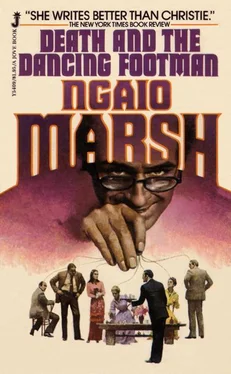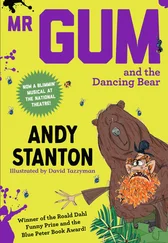Ngaio Marsh - Death And The Dancing Footman
Здесь есть возможность читать онлайн «Ngaio Marsh - Death And The Dancing Footman» — ознакомительный отрывок электронной книги совершенно бесплатно, а после прочтения отрывка купить полную версию. В некоторых случаях можно слушать аудио, скачать через торрент в формате fb2 и присутствует краткое содержание. Жанр: Классический детектив, на английском языке. Описание произведения, (предисловие) а так же отзывы посетителей доступны на портале библиотеки ЛибКат.
- Название:Death And The Dancing Footman
- Автор:
- Жанр:
- Год:неизвестен
- ISBN:нет данных
- Рейтинг книги:4 / 5. Голосов: 1
-
Избранное:Добавить в избранное
- Отзывы:
-
Ваша оценка:
- 80
- 1
- 2
- 3
- 4
- 5
Death And The Dancing Footman: краткое содержание, описание и аннотация
Предлагаем к чтению аннотацию, описание, краткое содержание или предисловие (зависит от того, что написал сам автор книги «Death And The Dancing Footman»). Если вы не нашли необходимую информацию о книге — напишите в комментариях, мы постараемся отыскать её.
Death And The Dancing Footman — читать онлайн ознакомительный отрывок
Ниже представлен текст книги, разбитый по страницам. Система сохранения места последней прочитанной страницы, позволяет с удобством читать онлайн бесплатно книгу «Death And The Dancing Footman», без необходимости каждый раз заново искать на чём Вы остановились. Поставьте закладку, и сможете в любой момент перейти на страницу, на которой закончили чтение.
Интервал:
Закладка:
“William?”
“What? Oh, ring up the police, I suppose,” said William, and he added in a vague mumble only heard by Mandrake: “Or you might go mad, of course.”
“I believe he would enjoy himself,” said Mandrake, quickly.
“I agree,” said Hersey, to Mandrake’s surprise.
“And Dr. Hart?”
“In a measure, I too agree. I think that you would be enormously interested in the behaviour of your guests.”
“You see?” said Jonathan in high glee. “Am I not right? So many Jonathan Royals. Now shall we go further? Shall we agree to discuss our impressions of each other, and to keep our tempers as we do so? Come now.”
“How clever of Jonathan,” thought Mandrake, sipping his brandy. “Nothing interests people so much as the discussion of their own characters. His invitation may be dangerous, but at least it will make them talk.” And talk they did. Mrs. Compline believed that Nicholas would suffer from extreme sensibility but would show courage and resource. Nicholas, prompted, as Mandrake considered, by a subconscious memory of protective motherhood, thought his mother would console and shelter. William, while agreeing with Nicholas about their mother, hinted that Nicholas himself would shift his responsibilities. Chloris Wynne, rather defiantly, supported William. She suggested that William himself would show up very well in a crisis and her glance at Nicholas and at Mrs. Compline seemed to say that they would resent his qualities. Mandrake, nursing his brandy glass, presently felt his brain clear miraculously. He would speak to these people in rhythmic, perfectly chosen phrases and what he said would be of enormous importance. He heard his own voice telling them that Nicholas, in the event of a crisis, would treat them to a display of pyrotechnics, and that two women would applaud him and one man deride. “But the third woman,” said Mandrake solemnly, as he stared at Madame Lisse, “must remain a shadowed figure. I shall write a play about her. Dear me, I am afraid I must be a little drunk.” He looked anxiously round, only to discover that nobody had been listening to him, and he suddenly realized that he had made his marvellous speech in a whisper. This discovery sobered him. He decided to take no more of Jonathan’s brandy.
Jonathan did not keep the men long in the dining-room and Mandrake, who had taken stock of himself and had decided that he would do very well if he was careful, considered that his host had judged the drinks nicely as far as he and the Complines were concerned but that in the case of Dr. Hart, Jonathan had been over-generous. Dr. Hart was extremely pale, there were dents in his nostrils and a smile on his lips. He was silent and fixed his gaze, which seemed a little out of focus, on Nicholas Compline. Nicholas was noisily cheerful. He moved his chair up to William’s and subjected his brother to a kind of banter that made Mandrake shudder and caused William to become silent and gloomy. Jonathan caught Mandrake’s eye and suggested that they should move to the drawing-room.
“By all means,” said Nicholas. “Here’s old Bill as silent as the grave, Jonathan, longing for his love. And Dr. Hart not much better, though whether it’s from the same cause or not, we mustn’t ask.”
“You are right,” said Dr. Hart thickly. “It would not be amusing to ask such a question.”
“Come along, come along,” said Jonathan quickly, and opened the door. Mandrake hurriedly joined him and William followed. At the door Mandrake turned and looked back. Nicholas was still in his chair. His hands rested on the table, he leant back and smiled at Dr. Hart who had risen and was leaning heavily forward. Mandrake was irresistibly reminded of an Edwardian problem picture. It was a subject for the Honourable John Collier. There was the array of glasses, each with its highlight and reflection, there was the gloss of mahogany, of boiled shirt-front, of brass buttons. There was Dr. Hart’s face so violently expressive of some conjectural emotion, and Nicholas’, flushed, and wearing a sneer that dated perfectly with the Honourable John’s period; all this unctuously lit by the candles on Jonathan’s table. “The title,” thought Mandrake, “would be ‘The Insult.’ ”
“Come along, Nick,” said Jonathan, and when it appeared that Nicholas had not heard him, he murmured in an undertone: “You and William go on, Aubrey. We’ll follow.”
So Mandrake and William did not hear what Nicholas and Dr. Hart had to say to each other.
Mandrake had suspected that if Jonathan failed it would be from too passionate attention to detail. He feared that Jonathan’s party would die of overplanning. Having an intense dislike of parlour games, he thought gloomily of sharpened pencils and pads of paper neatly set out by the new footman. In this he misjudged his host. Jonathan introduced his game with a tolerable air of spontaneity. He related an anecdote of another party at which the game of Charter had been played. Jonathan had found himself with a collection of six letters and one blank. When the next letter was called it chimed perfectly with his six, but the resulting word was one of such gross impropriety that even Jonathan hesitated to use it. A duchess of formidable rigidity had been present “I encountered her eye. The glare of a basilisk, I assure you. I could not venture. But the amusing point of the story,” said Jonathan, “is that I am persuaded her own letters had fallen in the same order. We played for threepenny points and she loathes losing her money. I hinted at my own dilemma and saw an answering glint. She was in an agony.”
“But what is the game?” asked Mandrake, knowing that somebody was meant to ask this question.
“My dear Aubrey, have you never played Charter? It is entirely vieux jeu nowadays, but I still confess to a passion for it.”
“It’s simply a crossword game,” said Hersey. “You are each given the empty crossword form and the letters are called one by one from a pack of cards. The players put each letter as it is read out into a square of the diagram. This goes on until the form is full. The longest list of complete words wins.”
“You score by the length of the words,” said’Chloris. “Seven-letter words get fifteen points, three-letter words two points, and so on. You may not make any alterations, of course.”
“It sounds entertaining,” said Mandrake with a sinking heart.
“Shall we?” asked Jonathan, peering at his guests. “What does everybody think? Shall we?”
His guests, prompted by champagne and brandy to desire, vaguely, success rather than disaster, cried out that they were all for the game, and the party moved to the smoking-room. Here, Jonathan, with a convincing display of uncertainty, hunted in a drawer where Mandrake had seen him secrete the printed blocks of diagrams and the requisite number of pencils. Soon they were sitting in a semicircle round the fire with their pencils poised and with expressions of indignant bewilderment on their faces. Jonathan turned up the first card:
“X,” he said; “X for Xerxes.”
“Oh, can’t we have another?” cried Madame Lisse. “There aren’t any — Oh no, wait a moment. I see.”
“K for King.”
Mandrake, finding himself rather apt at the game, began to enjoy it. With the last letter he completed his long word, “extract,” and with an air of false modesty handed his Charter to Chloris Wynne, his next-door neighbour, to mark. He himself took William’s Charter and was embarrassed to find it in a state of the strangest confusion. William had either failed to understand the game, or else had got left so far behind that he could not catch up with the letters. Many of the spaces were blank and in the left-hand corner William had made a singular little drawing of a strutting rooster with a face that certainly bore a strong resemblance to his brother Nicholas.
Читать дальшеИнтервал:
Закладка:
Похожие книги на «Death And The Dancing Footman»
Представляем Вашему вниманию похожие книги на «Death And The Dancing Footman» списком для выбора. Мы отобрали схожую по названию и смыслу литературу в надежде предоставить читателям больше вариантов отыскать новые, интересные, ещё непрочитанные произведения.
Обсуждение, отзывы о книге «Death And The Dancing Footman» и просто собственные мнения читателей. Оставьте ваши комментарии, напишите, что Вы думаете о произведении, его смысле или главных героях. Укажите что конкретно понравилось, а что нет, и почему Вы так считаете.












